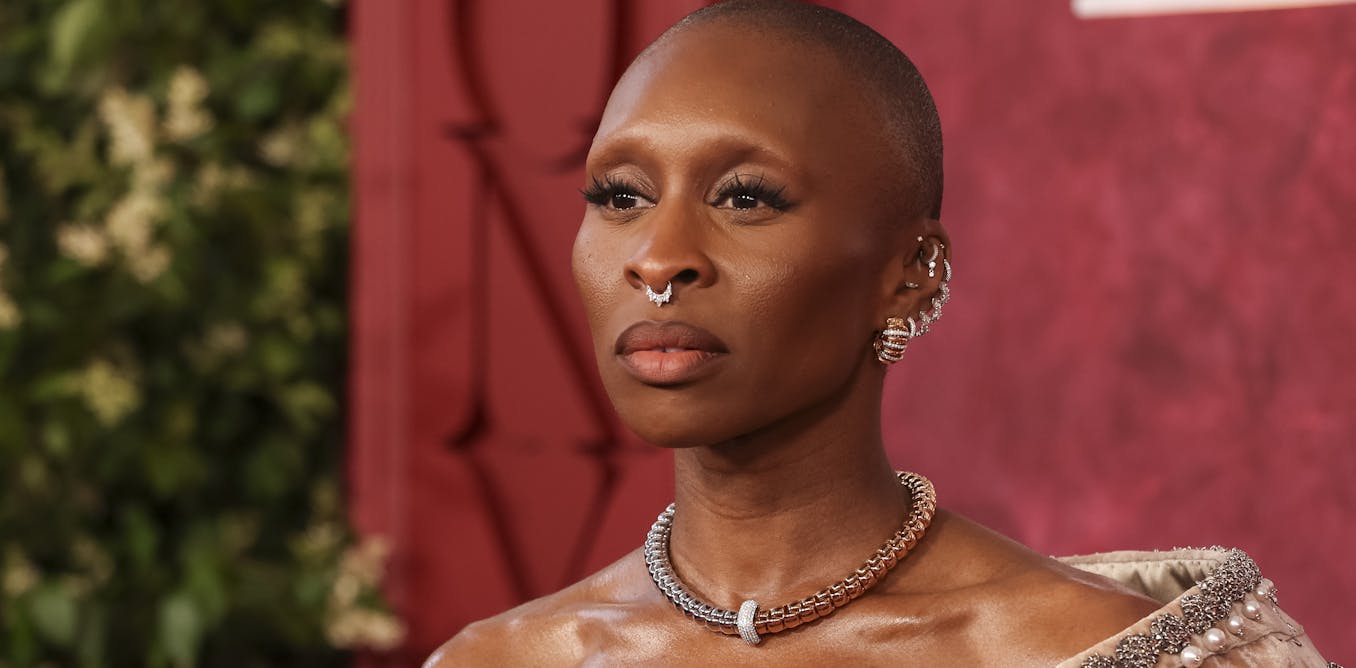Cynthia Erivo, the award-winning actor and star of Wicked, will play Jesus Christ at the Hollywood Bowl in Los Angeles between August 1 and 3 2025.
Unsurprisingly perhaps, the casting of the Wicked star as the son of God in Tim Rice and Andrew Lloyd Webber’s provocative rock opera Jesus Christ Superstar has caused upset on social media. Accusations of blasphemy have been made based on Erivo’s gender, sexuality, race – and even hairstyle.
The UK-based Christian magazine Premier Christianity responded to the outcry, featuring articles on whether a female Jesus was “inclusive” or “offensive”. Erivo laughed it all off.
I’m an expert in the reception of Biblical narratives. As such, I believe the outrage over this particular casting choice misses the fact that women have been involved in reimagining and retelling the Jesus story since antiquity.
The earliest gospels were originally written anonymously. They have only retroactively been ascribed to male authors, Matthew, Mark, Luke and John. Within a few generations after Jesus’s death, a work titled the Gospel of Mary was written from the perspective of Mary Magdalene, positioning her as Jesus’s favoured disciple and bearer of secret knowledge.
While we can’t prove the Gospel of Mary was written by a woman any more than we can prove the four canonical gospels were written by men, within the text the male disciple Peter attacks Mary precisely for being a woman. This suggests that the author was clued into gender dynamics, especially in the context of early Christian discourse and authority.
Looking for something good? Cut through the noise with a carefully curated selection of the latest releases, live events and exhibitions, straight to your inbox every fortnight, on Fridays. Sign up here.
As Christianity was gaining state approval within the Roman empire in the fourth and fifth centuries, the elite woman poet Faltonia Betitia Proba and the Byzantine empress Aelia Eudocia composed their own gospel retellings. They reconfigured the Hebrew Bible and gospel stories by using verses from Virgil and Homer.
These ancient works offer a distinctively female perspective. Their retellings pay careful attention to the experiences of female characters who are often marginalised in the canonical tradition, depicting the particularly gruelling experience of Mary’s maternal grief when her son was crucified.
These retellings aren’t apocryphal outliers – they belong to the same literary tradition of the four gospels Bible readers know today.
Just as Matthew and Luke (and possibly John) very clearly reworked Mark by adapting and rearranging scenes and strings of words, so too the Gospel of Mary retells the resurrection scene from John. Proba and Eudocia combine and rearrange gospel material to tell the story anew again.
Women continue to retell the Jesus story today, sometimes focusing more on the female characters. In Edinburgh, director Suzanne Lofthus has been writing and directing the city’s annual Passion Play for the last 20 years. Her 2024 and 2025 productions reimagined Jesus’s masculinity and placed the experiences of women at its centre. This year, she showed Jesus willingly getting stuck into the “women’s work” of making bread at the house of Mary and Martha, and questioning the culpability of the man in the story of the woman caught in adultery.
Catherine Hardwicke, meanwhile, best known for directing the first Twilight movie, directed The Nativity Story in 2006, a tender portrayal of Mary’s journey through her pregnancy, with particular emphasis on the women around her.
These creative contributions are really quite different to brutal, hypermasculine retellings such as Mel Gibson’s The Passion of the Christ (2004), for which a sequel is reportedly in development. Hardwicke herself contrasted The Nativity Story with The Passion, noting striking differences “especially [in] the quarts of blood per frame”.
Women playing Jesus
The role of Jesus is often played by women in these retellings. Erivo herself sang the role of Mary Magdalene in a 2017 New York concert that led to two all-female concept albums, controversially titled She Is Risen. The project was the brainchild of singer and actor Morgan James, who performed the role of Jesus.
Just last year, an all-female cast performed Jesus Christ Superstar in Santa Barbara, California. And a gender-blind casting led to the role of Jesus being given to Mina Kawahara in a 2017 production of the hippy-ish retelling of the gospel, Godspell, at Villanova Theatre, Pennsylvania. She followed a precedent of other female leads in this musical. The Japan-born Kawahara donned a white pantsuit with flowers in her hair.
A Japanese woman named Yuko Takeda took on the role of the son of God in the 2010 Helsinki Passion Play – another casting choice that enraged some conservative Christians. The female director, Miira Sippola, commented that the decision would free the audience from focusing too much on whether the performer resembles the Jesus of medieval artwork – already so far from the historical Jesus.
Over in New Jersey, a 15-year-old American girl played the role of Jesus in a 2023 passion play, carrying a 12-foot cross for over two miles in bare feet. These are a mere smattering of examples, of which there are many more.
The controversy over Erivo’s casting reveals more about cultural assumptions than historical precedent. The Hollywood Bowl’s Jesus Christ Superstar continues the often-overlooked tradition of women who have long participated in retelling, reshaping and performing the story of Jesus — on the page, on screen and on stage.
